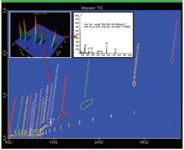Analysis of Polybrominated Diphenyl Ethers by Comprehensive GCxGC-TOFMS
Polybrominated diphenyl ethers (PBDE) are persistent environmental contaminants that are being extensively studied by environmental researchers worldwide. Their potential for toxicological impacts on humans and wildlife has made them a focal point of regulatory agencies. Their widespread use as flame retardants in electronics, household furniture, and many other building materials has lead to a need for analysis of many different sample matrices, including very complex environmental samples.
Polybrominated diphenyl ethers (PBDE) are persistent environmental contaminants that are being extensively studied by environmental researchers worldwide. Their potential for toxicological impacts on humans and wildlife has made them a focal point of regulatory agencies. Their widespread use as flame retardants in electronics, household furniture, and many other building materials has lead to a need for analysis of many different sample matrices, including very complex environmental samples.
The increasing need for a method which can chromatographically resolve several trace level PBDE congeners from complex sample matrices lends itself nicely to comprehensive two-dimensional gas chromatography (GC×GC) coupled to a time-of-flight mass spectrometer (TOFMS). GC×GC dramatically increases the separation power of the chromatographic system while increasing the detectability of analytes through the "cryo-focussing" effects of thermal modulation. The TOFMS detector offers the required acquisition speed (at full mass range) necessary to define ultra-narrow two-dimensional chromatographic peaks. The sensitivity of the TOFMS at full mass range also gives it a valuable advantage for characterization of new and emerging non-target contaminants.
Experimental
GC×GC-TOFMS: LECO Pegasus® 4D with an LN2 Modulator and Agilent 7890 GC
Column 1: HP-5 ms, 30 m × 0.25 mm × 0.25 μm
Primary oven: 120°C hold 1 min, 10°C/min to 300°C, hold 56 min
Column 2: RTX-200, 1.0 m × 0.18 mm × 0.2 μm
Secondary oven: + 30°C offset from main oven
Injection: 2 μL, splitless at 250°C
Carrier gas: helium at 2.0 ml/min, constant flow
Modulator temperature offset: 50°C
Modulation period: 4 s with a 0.8 s hot pulse time
MS: LECO Pegasus 4D
Acquired mass range: 45–1000 m/z
Acquisition rate: 100 spectra/s
Source temperature: 220°C
Samples
A standard containing 46 PBDEs (BFR-PAR, available from Wellington Laboratories, Guelph, Ontario, Canada) was used to prepare a calibration curve with analytes ranging from 10 to 4,000 parts per billion. These standards were analyzed on a LECO Pegasus 4D GC×GC-TOFMS using the experimental conditions described above.
Results and Conclusions
A mass spectral library was created using the ChromaTOF software and analytes in the BFR standard mixture. Calibration curves were generated for all analytes showing an average correlation coefficient of 0.99. A total ion two-dimensional contour plot is shown above in Figure 1 with PBDE congeners labeled.

Figure 1: Two-dimensional total ion contour plot with PBDEs labeled. An expanded 3D surface plot displaying the heptabromodiphenyl ether isomers and an example spectrum for these isomers are also shown.
The use of GC×GC-TOFMS offers many significant advantages for the analysis of PBDEs. The ability of the thermally modulated GC×GC system to enhance chromatographic resolution while dramatically improving detectability makes this instrument a valuable tool for analysis of trace level components in complex sample matrices. Coupling GC×GC with the sensitivity of a TOFMS detector acquiring full mass range spectra gives researchers all the tools necessary for detection of target PBDEs, as well as characterization of new and emerging non-target contaminants.

LECO Corporation
3000 Lakeview Avenue, St. Joseph, MI 49085
tel. (269)985-5496, fax (269)982-8977
Website: www.leco.com
